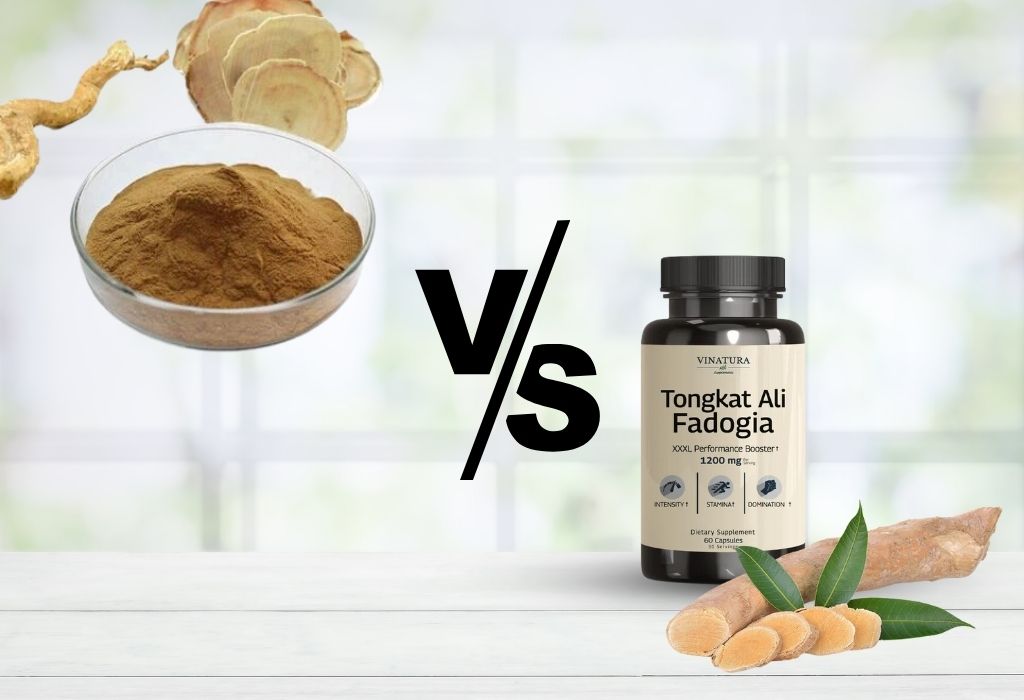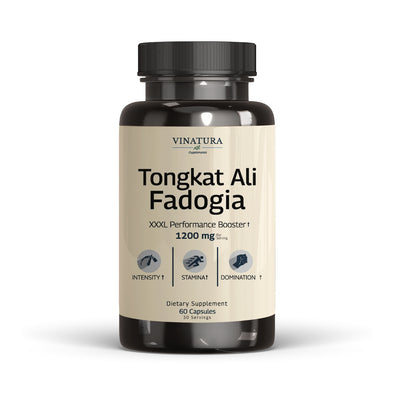
Tongkat Ali Root Powder Vs Tongkat Ali Extract: Which One Better?
With the growing popularity and demand of Tongkat Ali, there are many forms of Tongkat Ali available in the market, but in this blog, we will learn about two forms of Tongkat Ali, which are Tongkat Ali natural root powder and Tongkat Ali extract.
Both forms of Tongkat ali offer various health benefits, but which one should you choose?
In this article, we will discuss the difference between Tongkat Ali natural root powder vs Tongkat Ali extract to help you make an informed decision.
Before exploring further, please read the disclaimer located at the end of this webpage.
Key Takeaways
- Tongkat Ali powder offers affordability and versatility but lacks potency compared to the standardized extract.
- Tongkat Ali extract ensures effectiveness and convenience but comes with a higher price.
- The decision between Tongkat Ali powder and extract depends on individual preferences, needs, convenience, and quality considerations.
Pros and Cons of Tongkat Ali Powder
In case you want to explore the benefits of Tongkat Ali before choosing between Tongkat Ali root powder or extract, check out this video:
The first step involves meticulously cleaning and drying Tongkat Ali roots to produce Tongkat Ali powder.
These roots are then finely ground into a powder, with an additional sieving step to remove any larger particles.
Below are the advantages and disadvantages of Tongkat Ali powder.
Pros of Tongkat Ali Powder
- Tongkat Ali powder's price is affordable because making Tongkat Ali powder is more straightforward than its extract.
- When using the powdered form, you can adjust the dosage based on your requirements.
- Because the powder form is absorbed quickly in the body, the effects of powdered Tongkat Ali may appear more rapidly than with other forms.
Cons of Tongkat Ali Powder
- Tongkat Ali powder is made by grinding the dried root into a powder form, so it contains a lower concentration of active compounds.
- Due to its lower concentration, a higher dosage than Tongkat ali extract is necessary to achieve the desired results.
- As it is not standardized, concentrations may vary from batch to batch, which means quality cannot be guaranteed from batch to batch.
- Using Tongkat Ali powder requires mixing it with water or other beverages, which can be less convenient than Tongkat Ali extract.
- Powdered Tongkat Ali, ground from natural Tongkat Ali roots, may contain unwanted impurities.

Pros and Cons of Tongkat Ali Extract
Tongkat Ali extract is typically produced by isolating and concentrating the active components found in the roots of the Tongkat Ali plant.
This is done through various extraction methods, utilizing solvents such as water, alcohol, or advanced techniques to extract and concentrate the desired compounds.
Pros of Tongkat Ali Extract

Below are some advantages of Tongkat Ali extract:
- Tongkat Ali extract is commonly concentrated through the isolation and concentration of active compounds from plant material. This process yields a higher concentration of beneficial compounds, enhancing its potency and effectiveness.
- Tongkat Ali extract has a strong effect because it has a high concentration.
- Tongkat Ali extract has been measured and standardized when created so that the product quality will be better and safer for health.
- Usually extracted in capsule form, it is easy to use, convenient to drink, carry, and use whenever needed. The capsule can also be separated to dissolve in drinking water or mixed with food.
- Tongkat Ali capsule can be stored for a long time without spoiling. Its precise dosages are measured and pre-packaged, making monitoring and controlling your dosage easy. This is important for Tongkat Ali's use because the incorrect dosage can affect effectiveness and safety.
- Furthermore, Tongkat Ali Capsules are meticulously produced and packaged in controlled environments to guarantee quality and purity.
Cons of Tongkat Ali Extract
Below are some disadvantages of Tongkat Ali extract:
- High price because of the complicated extraction process
- Improper production or packaging of Tongkat Ali extract or unreliable sourcing of ingredients can lead to contamination with additives or unwanted substances. It is crucial to ensure proper handling and sourcing to maintain the purity and quality of the extract.
Read more: How To Tell If Tongkat Ali Is Real? Common Tongkat Ali Scams
The Comparison of Tongkat Ali Root Powder Vs Tongkat Ali Extract
- Similarity: Tongkat Ali extract and Tongkat Ali powder are both derived from the roots of the Tongkat Ali plant, resulting in similar benefits.
- Difference: For easy to understand and compare these types of Tongkat Ali, we provide you this comparison table of Tongkat Ali extract and powder following some criteria:
|
Criteria |
Tongkat Ali Root Powder |
Tongkat Ali Extract |
|
The making process |
Collect Tongkat Ali roots, dry and grind into powder |
Collect Tongkat Ali roots, use extraction methods to separate the active substances from the roots |
|
Physical Properties |
Powder, smooth, pureed |
Many different forms such as liquid, oil, capsules, alcohol form |
|
Active substance concentration |
Depends on quantity and quality of the root |
High concentration |
|
Effectiveness |
Lower |
Higher |
|
Dosage accuracy |
Varies according to quality and processing method |
Standardized, better dosage accuracy |
|
Characteristics of the making process |
Simpler, easier process |
Requires strict, complex processes to ensure quality and dosage |
The comparison table of Tongkat Ali powder and Tongkat Ali extract
Tongkat Ali Powder Vs Tongkat Ali Extract: Which One Should You Choose?
When deciding whether to use Tongkat Ali powder or Tongkat Ali extract, it is important to consider individual needs, preferences, and many other factors.
Careful consideration of these factors will help in making the right choice.
Tongkat Ali extract is the ideal choice for those seeking optimal results with minimal quantity.
It offers a higher concentration and potency compared to Tongkat Ali powder.
If you aim to enhance sexual desire or boost athletic performance, Tongkat Ali extract is the recommended option.
If you want to combine Tongkat Ali in your drinks like coffee, tea, and smoothies, Tongkat Ali powder is your choice, helping you enjoy your drink and supporting your health.
You also read: 7+ Benefits of Tongkat Ali Coffee: How to Make it Yourself
However, the Tongkat Ali extract capsule form can also be separated, taking the extract powder to mix with food.

While the Tongkat ali natural powder form is bitter and difficult to use, Tongkat Ali extracts in capsule form are easier to use and have been measured to standard concentrations.
Those who want to use natural Tongkat Ali to avoid adulterated extract products can use powder form.
However, that does not mean the powder form cannot be unadulterated.
Therefore, which type of Tongkat ali depends on each individual, and one should consider choosing reputable and transparent suppliers.
Ultimately, there is no general answer as to which form of Tongkat Ali is better. It depends on your needs, convenience, dosage control, and quality considerations.
Frequently Asked Questions
What Is the Best Form of Tongkat Ali to Take?
The best form of Tongkat Ali can vary depending on individual preferences and needs. While Tongkat Ali capsules or tablets are often favored for convenience, Tongkat Ali liquid extracts and tinctures are said to have better absorption rates than other forms.
Is Tongkat Ali Powder Effective?
Tongkat Ali powder is an extract derived from the Tongkat Ali plant, known for its numerous benefits. It shares similar advantages as natural Tongkat Ali itself. However, the powder must be crafted using natural ingredients, ensuring hygiene and preserving its beneficial properties. The manufacturing process should adhere to strict standards, guaranteeing quality and consistency with prescribed dosages.
What Is the Best Percentage of Tongkat Ali?
The term "best" percentage of Tongkat Ali refers to the potency of the standardized extract's active compounds, particularly the primary bioactive component called Eurycomanone. However, there is no universally accepted "best" percentage, as the optimal potency can differ based on individual requirements, desired effects, and the specific product.
What Is the Original Form of Tongkat Ali?
The original form of Tongkat Ali is the root of the Eurycoma longifolia tree, which is native to Southeast Asian countries, including Malaysia, Indonesia, and Thailand. For centuries, the roots of the Tongkat Ali tree have played a significant role in traditional medicine practices within these regions.
Conclusion
Tongkat Ali powder and Tongkat Ali extract offer various advantages and disadvantages. Ultimately, the choice between the two depends on individual needs and preferences.
While Tongkat Ali extract is more potent and convenient, Tongkat Ali powder offers versatility in how it can be consumed.
Regardless of the form chosen, it is important to ensure quality sourcing, production, and handling of the product to reap the full benefits of Tongkat Ali.
Read more:
Author

Product Disclaimer
Including an ingredient or study does not evaluate, endorse, or recommend any Vinatura product or any third-party product. Some ingredients discussed may not be used in any Vinatura product.
The content of the articles has not been evaluated by the Food and Drug Administration (FDA) and is not intended to promote or endorse any specific product. Any products sold on this website are not intended to diagnose, treat, cure, or prevent any disease.
Opinions and Endorsements
Any claims, statements, or opinions expressed in the articles are those of the author(s) and do not necessarily reflect the views or opinions of the manufacturers of the dietary supplement products. The products sold on this website are separate from the content of the articles and are not directly endorsed or associated with the information presented here.
Liability Disclaimer
The author(s) of the articles, website, and manufacturers of the dietary supplement products do not assume any liability for any potential consequences arising from the use of the information provided in the articles. Ingredient effects, dosages, and safety vary by individual, formulation, and context; some ingredients interact with medications or may be unsuitable during pregnancy or lactation. It is recommended that individuals consult with a qualified healthcare professional before making any dietary or lifestyle changes, including the use of dietary supplements.
Product Usage
Please refer to the product labels and packaging for specific usage instructions and guidelines for the dietary supplement products sold on this website.
Customer Support
For any concerns or questions regarding the dietary supplement products, please contact our customer support team, who will be more than happy to assist you.





Leave a Comment
Be the first to comment.
What do you think?